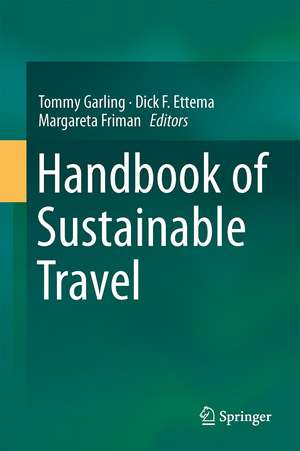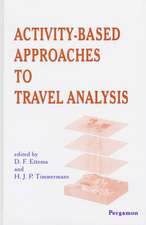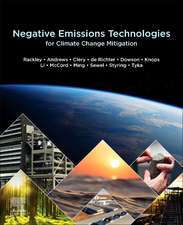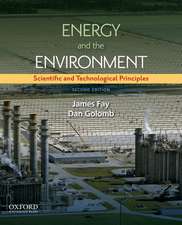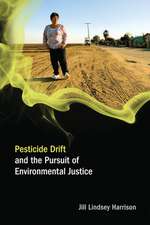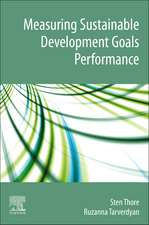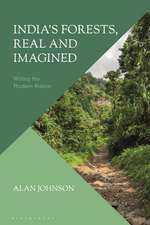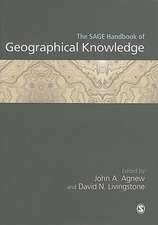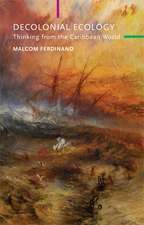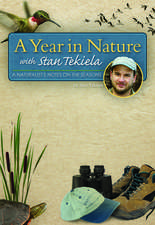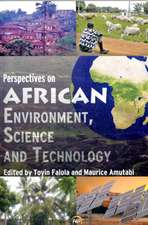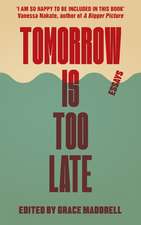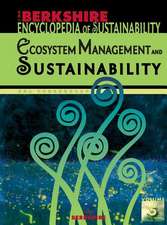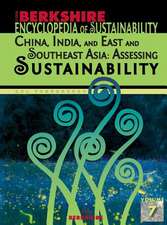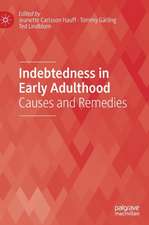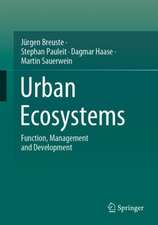Handbook of Sustainable Travel
Editat de Tommy Gärling, Dick Ettema, Margareta Frimanen Limba Engleză Hardback – 24 oct 2013
| Toate formatele și edițiile | Preț | Express |
|---|---|---|
| Paperback (1) | 643.48 lei 6-8 săpt. | |
| SPRINGER NETHERLANDS – 23 aug 2016 | 643.48 lei 6-8 săpt. | |
| Hardback (1) | 654.77 lei 6-8 săpt. | |
| SPRINGER NETHERLANDS – 24 oct 2013 | 654.77 lei 6-8 săpt. |
Preț: 654.77 lei
Preț vechi: 770.31 lei
-15% Nou
Puncte Express: 982
Preț estimativ în valută:
125.29€ • 131.08$ • 104.08£
125.29€ • 131.08$ • 104.08£
Carte tipărită la comandă
Livrare economică 02-16 aprilie
Preluare comenzi: 021 569.72.76
Specificații
ISBN-13: 9789400770331
ISBN-10: 9400770332
Pagini: 360
Ilustrații: XVI, 341 p. 28 illus., 7 illus. in color.
Dimensiuni: 155 x 235 x 25 mm
Greutate: 0.82 kg
Ediția:2014
Editura: SPRINGER NETHERLANDS
Colecția Springer
Locul publicării:Dordrecht, Netherlands
ISBN-10: 9400770332
Pagini: 360
Ilustrații: XVI, 341 p. 28 illus., 7 illus. in color.
Dimensiuni: 155 x 235 x 25 mm
Greutate: 0.82 kg
Ediția:2014
Editura: SPRINGER NETHERLANDS
Colecția Springer
Locul publicării:Dordrecht, Netherlands
Public țintă
ResearchCuprins
Part I: Introduction.- 1. Overview of Handbook of Sustainable Travel.- 2. Spatial, Generational and Gendered Trends and Trend-Breaks in Travel.- 3. Benefits of Travel: Needs versus Constraints.- 4. Satisfaction and Travel Choices.- Part II: Car Use.- 5. The Unsustainability of Car Use.- 6. Psychological Motives for Car Use.- 7. Pricing Methods to Influence Car Use.- 8. Social Marketing of Transportation.- 9. Psychological Contributions to the Development of Car-Use Reduction Interventions.- 10. Theoretical Underpinnings of Practical Strategies for Travel Behavior Change.- Part III: Travel and Social Sustainability.- 11. Social Exclusion and Travel.- 12. Rose Tinted Memories as a Cause of Unsustainable Leisure Travel.- 13. Health and Travel.- 14. Business Travel.- Part IV: Future Sustainable Travel.- 15. Do Future Land-Use Policies Increase Sustainable Travel?.- 16. Integrated Transportation Solutions: Visions of the Future.- 17. High Quality Public Transport: Gaining Acceptance of Bus Rapid Transit Systems.- 18. Non-Motorized Travel as a Sustainable Travel Option.- 19. E-Commerce and Sustainability.- 20. The Need to Change How People Think About the Consequences of Travel.- Index.
Textul de pe ultima copertă
This volume gathers distinguished researchers on travel behavior from a variety of disciplines, to offer state-of-the-art research and analysis encompassing environmental, traffic and transport psychology; transport planning and engineering; transport geography; transport economics; consumer services research; environmental sociology and well-being research. The underlying dilemma is that neither contemporary transportation technology nor contemporary travel behaviors are sustainable. The path toward sustainability is complex, because the consequences of changing technology and attempts to change travel preferences can be extreme both in economic and in social terms. The Handbook of Sustainable Travel discusses transportation systems from environmental, social and economic perspectives, to provide insights into the underlying mechanisms, and to envisage potential strategies towards more sustainable travel. Part I offers an introduction to the subject, with chapters review historical and future trends in travel, the role of travel for a good society, and the satisfaction of travelers with various features of travel options. Part II proceeds from the fact that the car is the backbone of today’s transportation system, and that a break with automobiles is likely to be necessary in the future. Contributors review the development of private car use, explore economic and psychological reasons why the car has become the primary mode of transport and discuss how this can be changed in the future. Part III addresses the social sustainability of travel, providing insights into the social costs and benefits of leisure, business and health travel, and taking into account the social costs or benefits of measures whose goals are primarily environmental. The authors provide the necessary background to judge whether proposed transport policies are also sustainable from a social perspective. Part IV highlights future alternatives to physical travel and surveys ecologicallysustainable travel modes such as public transport and non-motorized modes of transportation.
Caracteristici
Offers wide-ranging research and analysis of the environmental, social and economic aspects of sustainable personal travel Includes a clear account of how modern car-dependent travel evolved to its current dominance, with insight on how technology and behaviors might be altered towards more sustainability Provides in-depth discussion of future modes of travel, and alternatives to travel, that could lead toward environmentally sustainable travel
